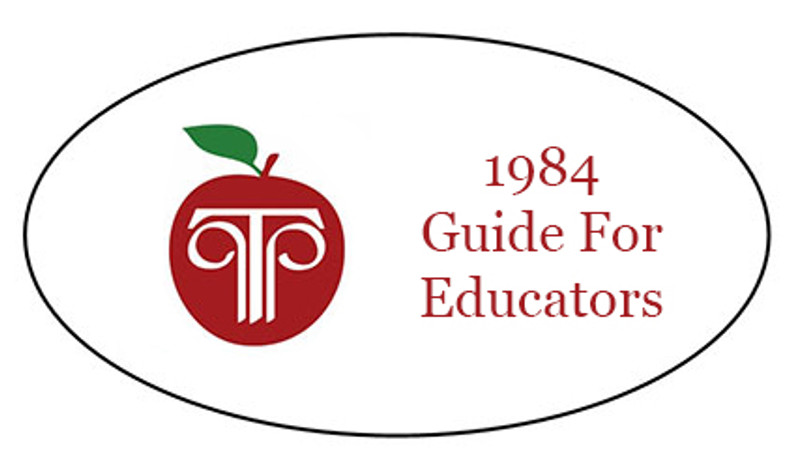If you're an educator about to unpack George Orwell's dystopian masterpiece, 1984, you're in for an intellectually stimulating ride that's as relevant now as it was when Orwell first penned it. Whether you're revisiting the novel for the nth time or introducing it to fresh minds, Nineteen Eighty-Four always provides topics for thought-provoking discussions as you explore this classic text.
1984 Book Plot Summary
Winston Smith, a resident of the totalitarian state of Oceania, navigates a world devoid of the personal freedoms most of us take for granted. In Orwell's grim vision, all aspects of life are controlled by the Party, led by the enigmatic figure of Big Brother. The state's slogan, "War is peace, freedom is slavery, ignorance is strength," encapsulates the pervasive manipulation and deceit dogging every citizen.
Winston dares to question the Party's absolute power, subtly rebelling through forbidden thoughts and an illicit love affair with Julia. Their resistance leads them to O'Brien, a high-ranking Party member who they believe harbors similar inclinations. However, O’Brien's true loyalty to the Party is revealed as Winston and Julia are captured and tortured. Ultimately, the narrative serves as Orwell's own warning against totalitarianism, surveillance, and the loss of individuality.
Themes in 1984
Surveillance: One of the most striking aspects of 1984 is the omnipresent surveillance that the Party employs. Everywhere there are screens, telescreens that watch your every move, never allowing a private moment. Teach your students about the chilling effect this level of control has on personal freedoms and the deterioration of trust in society.
The Nature of Truth: The concept of truth is a critical theme in 1984. The Party controls the truth, going as far as to change the historical record to fit its narrative. This theme is an excellent entry point for discussions about censorship, propaganda, and the role of media in disseminating information.
Individualism vs. Collectivism: Winston's internal struggle between conformity and individual thought is a complex theme for students to unravel. The Party's slogan directly promotes the idea that individual thought is the enemy. However, Winston's failed rebellion hints at the enduring human spirit—ready to fight even when the odds are insurmountable.
Language and Thought: Newspeak, the official language of Oceania designed to diminish anti-government sentiment, is a fascinating element to explore with students. By narrowing the scope of language, the Party significantly restricts the range of human thought—a pertinent message about the power of language and the potential for its abuse.
Quotes From 1984
To facilitate a poignant exploration of 1984, incorporate these quotes into discussions and writing exercises:
- "War is peace. Freedom is slavery. Ignorance is strength."
- "Big Brother is Watching You."
- "Freedom is the freedom to say that two plus two make four. If that is granted, all else follows."
Each of these quotes encapsulates a theme or a significant idea central to Orwell's narrative. They can serve as a springboard for deeper analysis by asking students to explore the context and implications behind them.
1984 Teaching Tips
To ensure your students grapple with 1984 in a meaningful way, consider the following teaching strategies:
Socratic Seminars: Engage students in a facilitated dialogue that encourages critical and creative thinking. These seminars can be structured around key moments in the book where characters' actions illuminate larger themes.
Literary Circles: Encourage different groups of students to focus on particular areas of analysis and meet at various stages to share their findings. This way, students can teach each other, and their diverse perspectives can enrich everyone's understanding.
Real-World Connections: Encourage students to make connections between the world of 1984 and contemporary society, like the rise of surveillance technologies, the erosion of privacy, and the relentless onslaught of media messaging.
Visual Aids: Incorporate images, videos, and artwork that relate to 1984 to provide students with additional context and to inspire varied interpretations.
By incorporating these elements into your teaching, you will guide your students toward a deeper understanding and critical reflection on 1984. This investment in their learning will not only broaden their literary appreciation but will also foster a more profound understanding of the social, ethical, and political implications embedded in Orwell's text. 1984 provides a rich tapestry of themes and discussions that will resonate far beyond the classroom walls.
Consider These Teaching Resources for Orwell's 1984
1984 LitPlan Novel Study - Step-by-Step Daily Lessons for 1984
1984 Google Forms Quizzes - Self-Grading Chapter Quizzes for 1984
AP Literature Unit - Unit of Study with AP Exam Styled Questions
Digital Board Game Review - Engage Students With a Fun, Digital Game For Whole-Book Review
Multiple Critical Perspectives - Look at 1984 From Three Different Perspectives: Formalist, Marxist, & Mythological/Archetypal




